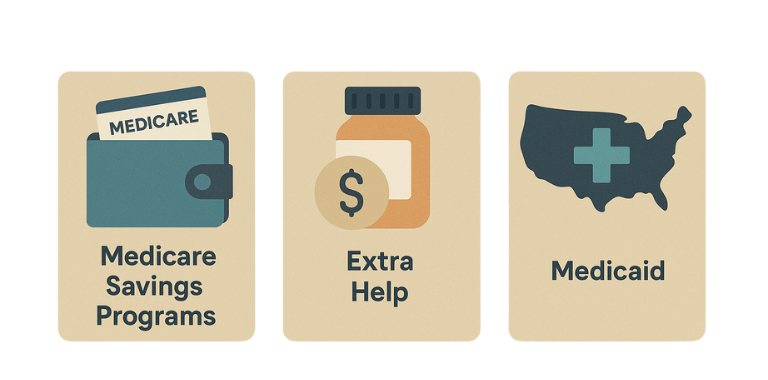Does Medicare Cover Dental, Vision, or Hearing?
HALTHCARE


From the infamous “Parts A, B, C, and D” alphabet soup to whether Medicare covers dental care, let’s clear up the confusion. We’ll base our answers on the official Medicare & You 2025 handbook to make sure you get accurate info.
Can I get help paying for Medicare?
Yes – if you’re on a tight budget, there are several programs that can help with Medicare costs:
Medicare Savings Programs (MSPs): These are state-run programs that help pay Medicare premiums (and sometimes deductibles and copays) for people with limited income and resources. There are four levels with fun names like QMB (Qualified Medicare Beneficiary), SLMB, QI, etc. For example, QMB will pay your Part B premium and any Part A or B deductibles/copays – essentially giving you free Medicare if you qualify. To get an MSP, your income and assets must be below certain thresholds (which vary a bit by state). If you qualify, it’s a huge help. According to the Medicare handbook, “if you have limited income and resources, you may be able to get help from your state to pay your Medicare costs” – that’s exactly what MSPs do. You apply through your state Medicaid office for these programs.
Extra Help (Low-Income Subsidy for Part D): This is a federal program to help pay for your prescription drug costs. If you have Medicare and your income is below about 150% of the poverty level (roughly $22,000/year for a single person in 2025) and limited assets, you can get Extra Help. It can significantly reduce your Part D premium and copays (some people pay $0 for generics with Extra Help). The best part: if you qualify for Medicaid or an MSP, you automatically get Extra Help for drug costs. You can also apply for Extra Help via Social Security.
Medicaid: As discussed above, if your income is low enough, you might qualify for full Medicaid on top of Medicare. Medicaid can pay your Medicare premiums and cost-sharing, and it provides benefits Medicare doesn’t (like long-term care, dental, etc.). Having both Medicare and Medicaid is called being “dual eligible.” In this case, Medicare is primary for most services, and Medicaid steps in as secondary insurance. There are even special Medicare Advantage plans called “Dual Eligible SNPs” designed for people on Medicare+Medicaid.
Does Medicare cover dental, vision, or hearing services?
This is a hugely popular question – and for good reason. Original Medicare (Part A and B) has gaps in coverage for routine dental, vision, and hearing care:
Dental: Routine dental care is not covered by Medicare. That means no coverage for checkups, cleanings, fillings, tooth extractions, dentures, etc., under Original Medicare. Medicare will only consider paying for dental services if they are integral to a covered medical procedure (for example, if you’re in the hospital and need a dental exam prior to a heart valve surgery, or certain complicated jaw surgeries). But routine dentist visits – you’re on your own (or need other insurance).
Vision: Medicare does not cover routine eye exams for glasses or contacts. It also doesn’t cover glasses or contact lenses in most cases. The exceptions are very limited (e.g., one pair of glasses after cataract surgery with an intraocular lens implant – Medicare will pay for that). But if you just need an annual eye refraction for new glasses, that’s not covered.
Hearing: Medicare does not cover hearing aids or exams for fitting hearing aids. It will cover diagnostic hearing exams if your doctor orders them to investigate a medical condition (like hearing loss due to injury or disease), but the cost of hearing aids themselves and routine hearing tests for fitting are all out-of-pocket under Original Medicare.
This is definitely a pain point for many seniors, since dental, vision, and hearing needs tend to increase as we age. So what can you do? You have a few options:
Medicare Advantage plans: Many Medicare Advantage (Part C) plans offer coverage for dental, vision, and hearing services as extra perks. For example, an Advantage plan might cover two free cleanings a year, an eye exam and some credit toward glasses, and partial coverage for hearing aids. The extent of coverage varies by plan, but this is a big reason some people choose Medicare Advantage – to get at least some help with these services.
Standalone insurance or discount plans: You can purchase separate dental insurance or vision plans outside of Medicare. There are also discount programs and networks for hearing aids (some big membership stores have them). While these involve additional premiums or costs, they can reduce your out-of-pocket expense if you have significant needs (like expensive hearing aids or lots of dental work).
Pay out of pocket and budget accordingly: Not a fun option, but many Medicare beneficiaries simply budget for things like dental care or new eyeglasses each year since Original Medicare won’t pay. Preventive care (like regular cleanings) might save money by avoiding bigger problems down the road, even if you have to pay for it yourself.
It’s worth noting there’s ongoing talk in Washington about adding some of these benefits to Medicare, but as of 2025, routine dental/vision/hearing are still not covered by Original Medicare.
If expenses are a major concern, look into an Advantage plan that includes those benefits – just weigh the trade-offs (like networks and prior authorizations) that come with Advantage plans, as we discussed earlier.
Remember, Medicare has a lot of moving parts, but you don’t have to figure it all out alone. You can call 1-800-MEDICARE for help, or visit Medicare.gov for information and to sign up for a free Medicare account (this lets you see your claims, track prescriptions, etc.).
Finally, Medicare beneficiaries learn new things as the program evolves (for example, that new $2,000 drug cost cap in 2025!). With a little knowledge, you can make the most of your Medicare benefits and get the health care you need without breaking the bank. Happy Medicare-ing!
Sources: Medicare & You 2025 official handbook, Medicare.gov.
